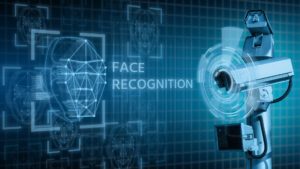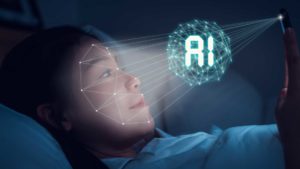Table of Contents
In recent years, facial recognition technology has advanced due to the advent of artificial intelligence, leading to its transformational impact across industries and reshaping our interactions with technology. By harnessing the power of deep learning algorithms and neural networks, AI face recognition systems have achieved remarkable accuracy in analyzing and identifying human faces using biometric face scans. This article explores the advancements, applications, and ethical considerations surrounding AI face recognition, shedding light on its immense potential benefits and the critical need for responsible implementation.
The Role Of Artificial Intelligence in Face Recognition Technology

AI face recognition plays a pivotal role in identifying and authenticating individuals based on their unique facial features. This system uses facial recognition machine learning i.e. artificial intelligence and deep learning algorithms. These systems possess the capability to analyze and match facial patterns against a database using facial recognition scanner tools. It facilitates businesses in seamless and secure access control, identity verification, and personalized experiences. As AI face recognition continues to advance, biometric facial technology becomes increasingly reliable, serving as an invaluable tool for enhancing security measures, improving user experiences, and streamlining identity management processes.
Face Biometrics for Customer Authentication:
AI face recognition has become a popular method of authentication. With the integration of facial biometrics, individuals can unlock their smartphones, access secure facilities, or authorize financial transactions simply by using their faces. This convenient method and security make AI face recognition a promising alternative to traditional password-based authentication methods.
AI Face Recognition Process
AI face recognition is a key feature of biometric facial technology, offering advanced technology in identifying and authenticating individuals based on the unique face characteristics of a user. This recognition system can accurately analyze and match facial patterns against a database by harnessing the power of artificial intelligence and deep learning algorithms, enabling seamless and secure access control, identity verification, and personalized experiences. This technology has revolutionized the field of biometrics, providing a convenient and efficient way to authenticate individuals in various industries, including security, healthcare, retail, and entertainment. With continuous advancements in AI face recognition, biometric facial technology is becoming increasingly reliable, making it an invaluable tool for enhancing security, improving user experiences, and streamlining identity management processes.
Top 5 Use Cases of AI Face Recognition

The top use cases are as follows:
Security and Law Enforcement
In the security and law enforcement sector, it is utilized for surveillance, access control, and forensic investigations. AI face recognition systems can analyze live video feeds or images to identify individuals of interest, detect potential threats, and enhance public safety.
Retail Industry
In the retail industry, face recognition is employed for personalized marketing, customer analytics, and targeted advertising.
Healthcare Industry

In the healthcare sector, it can facilitate patient identification, streamline medical record access, and improve the accuracy of diagnosis and treatment.
Travel Industry
In the travel industry, face recognition systems can expedite passenger boarding processes, reducing queues and enhancing overall travel experiences.
Gaming Industry
AI face recognition is used in entertainment and gaming applications to create personalized experiences, such as augmented reality (AR) filters or character customization.
Government Agencies
Robust regulations and ethical frameworks are necessary to mitigate the potential misuse of AI face recognition technology. Governments and regulatory bodies should establish clear guidelines for using face recognition in public spaces, ensuring that it is deployed responsibly and with respect for individual rights. Organizations must also implement strict security measures to protect face biometric data from unauthorized access.
Ethical Considerations

While AI face recognition offers privacy, concerns are paramount, as the technology involves collecting and analyzing personal biometric data.
- Organizations must ensure transparency and obtain proper consent when implementing face recognition systems, adhering to data protection regulations and guidelines.
- Additionally, there is a risk of biases in AI-based algorithms, as they can be influenced by the data they have been trained to do. Organizations must actively address these biases and ensure fairness and inclusivity in their AI models.
While addressing ethical concerns, it is important not to overlook the potential benefits of AI face recognition technology. Organizations should engage in transparent discussions and collaborate to establish ethical standards and guidelines for implementing responsible AI face recognition systems.
Conclusion
AI face recognition technology has been declared an effective solution with vast capability factors across various industries. Its ability to research and discover human faces as it should be has transformed safety, authentication, and user experience. However, agencies must consider ethical considerations before the realistic implementation of AI face recognition technology. Using proper stability among technological improvements and ethical guidelines, AI face recognition can enhance our lives while safeguarding individual rights and societal values.
Author Profile

- Guest Blogger & Outreach Expert - Interested in Writing Blogs, Articles in Business Niche | News Journalist By Profession in the United Kingdom
Latest entries
 BusinessJuly 1, 2025Wills for Business Owners: Safeguarding Your Enterprise and Legacy
BusinessJuly 1, 2025Wills for Business Owners: Safeguarding Your Enterprise and Legacy Business TipsJune 6, 2025Confidence That Connects the Message
Business TipsJune 6, 2025Confidence That Connects the Message GamingMay 9, 2025Why AI Personalization Is Key for the Next Generation of Betting Platforms?
GamingMay 9, 2025Why AI Personalization Is Key for the Next Generation of Betting Platforms? Business StrategiesMay 1, 2025Key Business Development Strategies for Fostering Sustainable Growth
Business StrategiesMay 1, 2025Key Business Development Strategies for Fostering Sustainable Growth




